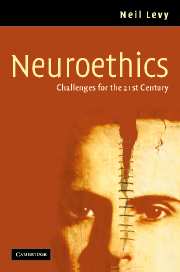Book contents
- Frontmatter
- Contents
- Preface
- Acknowledgements
- 1 Introduction
- 2 Changing our minds
- 3 The presumption against direct manipulation
- 4 Reading minds/controlling minds
- 5 The neuroethics of memory
- 6 The “self” of self-control
- 7 The neuroscience of free will
- 8 Self-deception: the normal and the pathological
- 9 The neuroscience of ethics
- References
- Index
5 - The neuroethics of memory
Published online by Cambridge University Press: 16 December 2010
- Frontmatter
- Contents
- Preface
- Acknowledgements
- 1 Introduction
- 2 Changing our minds
- 3 The presumption against direct manipulation
- 4 Reading minds/controlling minds
- 5 The neuroethics of memory
- 6 The “self” of self-control
- 7 The neuroscience of free will
- 8 Self-deception: the normal and the pathological
- 9 The neuroscience of ethics
- References
- Index
Summary
One scenario which simultaneously fascinates and horrifies many people is the prospect that our memories could be altered by others. The number of films depicting this kind of scenario bears witness to its fascination; think of Total Recall, Eternal Sunshine of the Spotless Mind or Dark City. The prospect of losing our memories, or having them replaced with false recollections, exerts such power over us because we all recognize, more or less clearly, that our memories are, in some sense, us: our very identities (in one sense of that multiply ambiguous term) are constituted by our past experiences insofar as we can recall them and insofar as they shape our present behavior, thoughts and desires.
The so-called memory criterion of personal identity was originally proposed by John Locke, the great seventeenth-century English philosopher. Locke argued that a person at time t was the same person as an individual at some earlier time if at t they are able to remember experiences of that earlier individual. Locke's criterion came under attack almost immediately, and with good reason: philosophers like Thomas Reid pointed out that the memory criterion was circular. Memory presupposes personal identity, and therefore cannot constitute it. I can only remember things that actually happened to me; that's part of the very definition of memory (if I seem to remember being abducted by aliens, but I was never in fact abducted by aliens, I don't actually remember being abducted by aliens; “remember” is a success word and is only appropriately applied when the event actually happened, and the recollection is appropriately caused by the event).
- Type
- Chapter
- Information
- NeuroethicsChallenges for the 21st Century, pp. 157 - 196Publisher: Cambridge University PressPrint publication year: 2007



